The Wytham Ecosystem and Climate Change Poetry
Woodland Words on 8th September were on ‘The Wytham Ecosystem and Global Climate Change’, with Yadvinder Malhi FRS, Professor of Ecosystem Science at the Oxford University School of Geography and Environment. While walking us down from the Chalet to his experimental site Yadvinder introduced the woods as a place to understand ecological processes: not pristine and ancient, but left undisturbed and conserved ever since Charles Elton’s pioneering animal ecology studies as ‘a place to let nature go’ and to see what happens. Long term monitoring of the great-tit population – comprehensive records of how ‘tit begat tit’ – go back to the 1950’s, and badger studies to the 60’s.
Automation now allows researchers to monitor and record ecosystem processes continuously over long periods. The data not only help us to understand the functioning of an ecosystem at a fundamental level, but also serve as a ‘sentinel for change’, alerting us to impacts of climate change – in Wytham, such changes are hotter drier summers, more extreme weather, and ‘the shifting of spring’. Yadvinder’s research now extends to include Wytham Woods, as well as his numerous tropical forest sites, in an international network for global ecological monitoring (GEM). It is ‘the best-studied patch of woodland on Earth’, one of the calibration points for Nasa satellites mapping global vegetation structure.
On the ground, the experimental plot for which carbon flux is being measured is a 600 X 300 metre area of deciduous woodland - mainly ash and sycamore - on the outcrop of Jurassic limestone that caps Wytham Hill. Every tree is marked and its annual increase in biomass recorded. Rising into the topmost branches is the walkway, on to which we were all allowed to climb, and the flux tower that houses data-logging instruments which continuously record ‘the breath of the forest’ – for example, a sonic anemometer measures second-by-second flow of carbon dioxide into and out of the canopy. In summer there is a large net flow into the forest and out at night; in winter, with little photosynthesis, carbon dioxide is slowly released by both day and night from plants and soil. Biomass is still increasing, and the woods absorb 1 tonne of carbon per hectare per year, acting as a carbon sink. Yadvinder tells me that, at a rough estimate, Wytham and equivalent university and college-owned woodland near Oxford (like Bagley Wood) absorb the equivalent of about half of the university’s energy and heating related carbon emissions, which shows how important woodland restoration can be.
What happens in Wytham to the ‘captured sunshine’, bound up in trees by photosynthesis? Trees use only 10% for woody growth – the rest goes on plant defence, and leaves, roots and fruit. And 9% of the energy ends up in animals, most in deer (6%), 2 and 1% in squirrels and badgers, respectively. In tropical forests, far more – as much as 25% - ends up in mammals: 25%, in deer, bearded pigs and elephants.
In the afternoon poetry writing workshop, Romola asked writers to note down memorable phrases as a starting point for poems. There was no shortage of visionary words and images that we recalled verbatim from Yadvinder’s own account (I have italicized them above). How close good science is to poetry!
Sarah Watkinson
Here follows a selection of poems submitted by workshop attendees:
ReW'ld
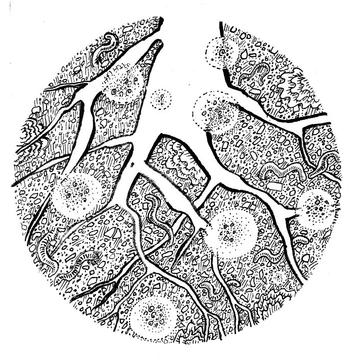
Illustration by Simon Pressey
Not at all quiet, these roots - down here it’s noisy as hell…
Never an end to the pushing and shoving- even the lichen busily etching its scratchy
patterns, the fungi greedily swelling and bursting in empty spaces, both expanding
their own estates by a kind of deafening stealth - as if they imagine
no-one notices.
And the worms! My god - heard them
Brawling just the other night,
Head butting the earth and each other,
Battering tunnels in darkness.
Decay and its chemically team the worst of all - a squelching secretion with
fulminating rallies of belching and stinking farts.
What heaven above,
In amongst that quietly rustling
Green canopy -
Imagine the peace!
Jane Muir
Lease-hold
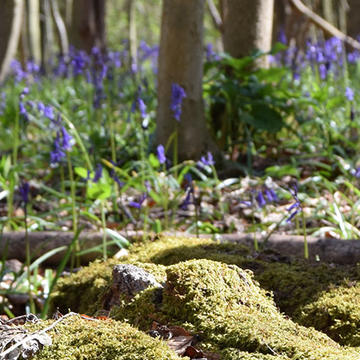
These woods, stripped by war,
felled, abandoned, grow again,
their saplings cross-hatching
sunlight with nets of green,
deer crimping edges into
bluebells, hazel and wild garlic.
These woods rest now, untouched.
Becoming themselves in leaf furl, leaf fall,
they breathe in the gold of summer,
drop amber, rose and russet
leaves into soil - the good housewifery
of sugars stored, a cleaned house
that is on loan, in bare trust
between ourselves and this planet Earth.
Susan Wood
Forest Breaths
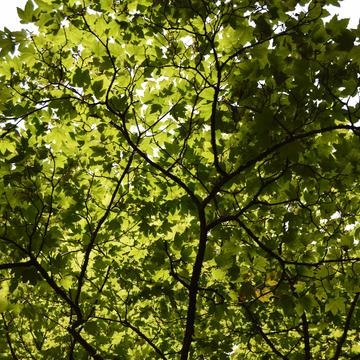
We
suck up the heart of the sun for you
transform its light into life for you
set up the cool of the shade for you.
We
soak up the blood of the rain for you
save it up time and again for you
keep its floods at bay for you.
We
mash up the mix of the air for you
store up its life for you
clean up your waste for you
keep up the flux and the flow for you.
We
warm up your soul in the dark for you
fuel the fires of your wars for you
break down the dead for you
feed the earth for you
nurture each birth in the soil
for you.
Each breath we take
Each bough you break
Your own grave
you make.
Garry Maguire
Elixir
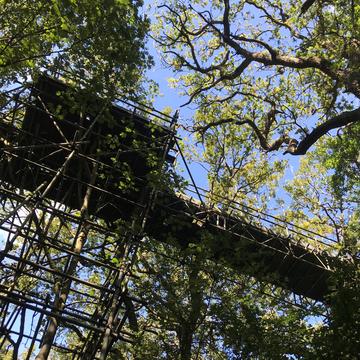
Sunrise, new day
Stretch out, unfurl leaves
Open stomata to sunlight
The elixir descends
Down to the roots
Spreading through earth
Starting the engine
Of capillary action
hear it glugging up
Up to the canopy
And off as oxygen
into the atmosphere
Collaboration of Yasmin Mendes and Ursula White
Wytham Words
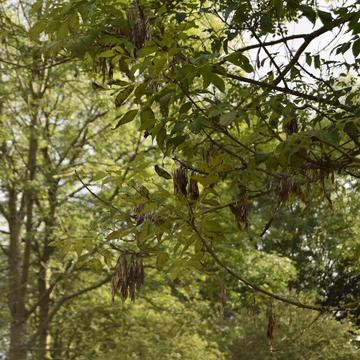
Losing a native tribe
dis-ease on the breeze
Mourning from the canopy view
down to earth bound threads of empathy
What will come after the woodpeckers feast?
Like seeds that only split in fire
grey Ash will sprout black spores
Shifting altered states
Communications pass on the wind
trace through the soil
For balance watchfulness is no longer enough.
Jane Corbett
Ten Butterflies
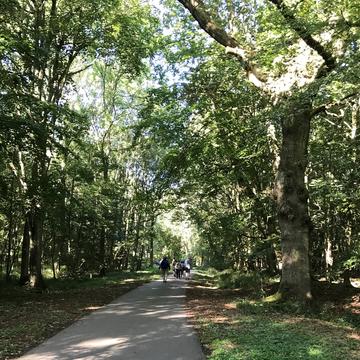
Ten poets walking in a wood, talking as they walk.
Breathing in the woodland air, admiring the trees,
And talking.
Strangers at first, slightly wary.
Ideas and questions start to flow
Talk develops and broadens.
They talk about trees and badgers,
About rivers, forests and oceans.
They talk about fears and challenges
They ask what will they do?
They make decisions, plans, commitments.
They go home and talk some more
To friends and neighbours who talk to others.
Soon ten voices become a hundred
And then a hundred becomes a thousand
All walking and talking
And then there are ten thousand, one hundred thousand,
Ten million and yet more,
Talking, walking, writing, marching.
A tipping point!
And finally, THEY listen, THEY have no choice.
The pressure becomes irresistible,
Things happen.
The Greenland ice begins to thicken,
It rains in the Sahel,
The oceans recover.
Nature is coming home.
Ten poets walking in a wood.
Ten butterflies flapping their wings.
We can breathe again.
If only !
James White
Re-wilding at Wytham Woods
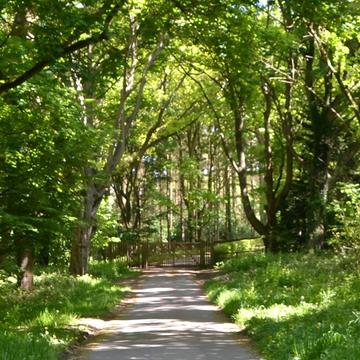
Days of being wild
Like the turbulent flow of air
Step back
And observe the velocity
Of extinction events
Bring them back: squirrel, deer, boar,
The interglacial elephant
Stamped out
Under shifting springs
Uncook the meat
After twenty million litres of orange
Oh how I want you green
Leaves from canopy to floor
Light hanging
On their branches until night
Fall to the forest floor
Scurried soil
Where one tree can be many trees
That die standing up and fall down
To be replaced
By passive management and
Post-human diversity
The kind of ecology to let nature be
To let it be wild
When we're not looking
Wild when we're gone
Stephen Rocks
If you are interested in attending a similar event, do keep an eye on our events page. Our next poetry workshop will be on 10th November, on the theme of badgers.



